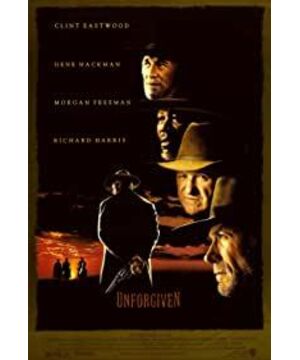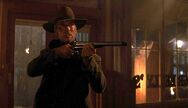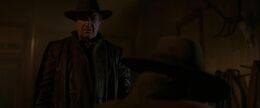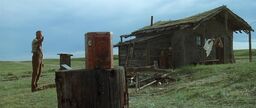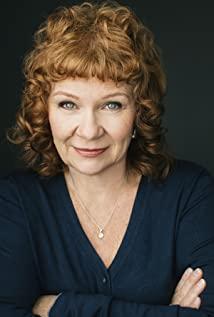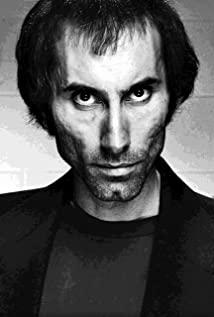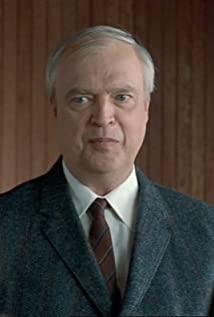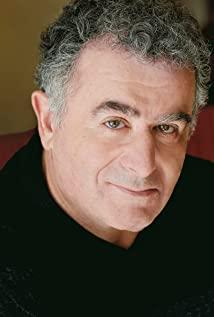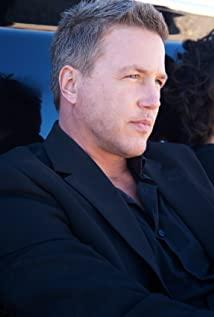When discussing the "theme" of "Unforgivable", we can easily fall into the whirlpool of "anti-violence" and "feminism". It is undeniable that brutal harm and unforgivable "revenge" naturally bring out the "central idea" of "anti-violence" and "feminism". However, when we use certain tags to comment on movies, the audiovisual experience and emotional shock brought by the movie will be greatly reduced.
Of course, violence is a topic that cannot be avoided in "Unforgivable", but the film is definitely not as simple as "anti-violence". It is more about exploring all aspects of violence, such as the origin of violence, the consequences of violence, the loss of control of violence, and so on. There are also relations between violence and law, violence and justice.
Morgan Freeman, one of the leading actors of "Unforgivable", when talking about the "connotation" of the film, said the following "gold sentence"-violence will only breed evil results, and violence will only corrupt people's hearts. The core of this "golden sentence" is still "anti-violence", but it also reveals the process and conclusion of the film's discussion of "violence".
It is said that "Unforgivable" is a film highly loyal to the script. It can be seen that the screenwriter David Webb Pepples has made a great contribution to the film. David Weber Pepples also said that the film is not so much anti-violence as it exposes the shocking side of violence.
Yes, the most terrifying thing about violence is not the violence itself, but the series of chain reactions triggered by the violence. This is the most "horrifying aspect" of violence.
The harsh words of the prostitute attracted the brutal injury of the cowboy.
The cowboy's "unforgivable" has attracted bounty killers.
Sergeant Billy’s "burst of law enforcement" or "excessive law enforcement" laid the roots of the disaster.
The "success" of the bounty killer William Monney made the sheriff angry, so he tortured Ned Logan to death.
The death of Ned Logan ignited the flames of vengeance in the heart of William Monney, who had lost his best friend. In the end, he killed himself in the tavern.
Little Sheriff Billy never thought he would die like this, he didn't even have time to finish building his new house.
The prostitute said that "sin" would not be disfigured, but her little "verbal violence" opened the Pandora's box of violence.
William Monney's partner, the myopic kid Kufee, was a superstitious gunman who believed in Western mythology at first. His confidence in stepping into the bounty killer business mainly comes from fantasy and bragging, and he has found a partner who was once frightening.
After shooting a cowboy who was going to the toilet at close range, Kufee did not "grow up" in the blood, but was deeply disturbed and fearful-the taste of killing is far less beautiful than imagined, and it often brings nightmares. .
At this time, as a senior killer, William Monney said his "golden sentence"——
"The taste of killing is uncomfortable, you have taken everything from him and his future."
William Monnie was once a murderer. Even so, he never enjoyed the "taste of murder"-it can be seen that he still has a conscience. It was this conscience that made Jinpan wash his hands and change his mind after meeting his deceased wife and become a self-reliant farmer.
"The taste of killing is uncomfortable", but the death of a close friend is "unforgivable"! The determination of revenge allowed William Monney to instantly regain his bloodiness and bravery.
Sergeant Billy Jr. satirized William Mooney as a "killer of women and children." He replied fiercely: "I have killed women and children. I have killed everything that moves!" He raised his gun and dropped five people. Fall down in response. He was red-eyed!
The writer who set up a biography for the killer has never seen such a "magic skill" in killing people, and I sincerely sigh.
William Monney calmly said: "This time I probably had good luck. But when I kill people, luck is always good." This is probably the most domineering "manifesto" of a killer.
In the film, violence or killing does not come from pleasure or free will. Killing is repeatedly out of control during infection or evolution.
"Unforgivable" is definitely one of the best "interpretations" of violence. But it is a great movie because it breaks away from the "facialization" inherent in western movies, and gives each main character humanity and blood.
When William Monney decided to return to the arena, he was already "heroic". When he tried his gun, his marksmanship was very rusty. But being destitute still made him decide to give it a go.
After embarking on the journey, William Monnie regained the feeling of "killer" step by step. In the final tavern battle, he successfully interpreted what is called "The Return of the King".
After being fatally beaten by the sheriff Billy Jr., William Monney was dying and almost lost his life. When his life was dying, he had to endure the torture of his conscience: "I saw the angel of death, and the river of the nether.... Don't tell my children what happened to me in the past."
After the strong will to survive pulled William Moni back from the death, he began to transform. He regained the confidence of the killer. He looked forward to receiving the bounty and improving the farm and family life.
Originally, after receiving the bounty, William Moni planned to "stop". But the death of Ned Logan, his friend, transformed him again. Once William Moni was possessed by God, he opened the "kill without mercy" mode of revenge.
Ned Logan and Kufee, as William Monney's partners, played the roles of "good friends who smashed their friends" and "worshippers of Western legends" respectively.
Ned Logan's desire for bounty is not strong, but he knows that William Monney needs his guardianship, and his friendship with William Monie is even greater than his feelings for his wife. Ni’s crazy revenge is also a cherishment of this friendship.
Ned Logan is actually pessimistic about the prospect of winning the bounty, but he can accompany William Monney in a positive attitude-his heart is struggling, but he has no regrets for all his efforts.
Kufei is a newborn calf who is not afraid of tigers. He speaks boldly and acts recklessly. He wakes up from his illusion until he really "should". He became the child without a master beside the "idol"-oh my god, he is really still a child.
When life and death were in doubt, Ned Logan and Kufee "sinked" together in Gentle Town-they repeatedly "advanced" the bounty from the prostitutes.
The film’s struggle with Ned Logan and Kuffet’s transformation are not as much “inked” on William Moni’s body, but the chaos and impermanence in their bodies make them flesh and blood outside of the Western film’s “Facebook” Plump character.
Sheriff Little Billy looks like a "cruncher" who abuses violence. Maybe he doesn't like most of the audience, but he is by no means as simple as a villain.
In a sense, he is an enforcer who maintains and practices the "law" in his own way.
After the prostitutes were injured by the cowboys, although he opposed the prostitutes' violence in favor of violence, he also allowed the cowboys to compensate the valuable horses-this is what he thinks is "fair". However, whether in the eyes of prostitutes or ordinary people, such "fairness" is far from enough.
He did not allow bounty killers to come to the town, the fundamental reason is to maintain the "rule of law." Of course, his way of upholding the "rule of law" is indeed too crude.
Outside of work, he is building his new house. Judging from the fact that he built the house carefully, he is actually a person who loves life.
He is violent and cruel, but he does not put the bounty killer to his death, indicating that the "law" is a little bit binding on him. Only when the other party ignores his "law", will he retaliate and kill the other party as his duty.
Before he was shot, he still despised William Money for giving the "killer of women and children", indicating that there is so-called "justice" in his heart-but his "justice" has also gone far away from the right track.
He is also a person with a great sense of humor, and his "creative" "Duke of Death" and "Duck of Death" "duck" make people can't help but laugh.
Sheriff Little Billy is not a big villain in Western movies in the general sense. He is only loyal to his duties in a cruel and evil way. His actions reflect the absurdity of the "rule of law".
As a vulnerable group, prostitutes are obsessed with revenge when justice is not publicized, which is "justified" to a certain extent. It is easy to mobilize the sympathy and anger of the audience, thereby gaining their irrational support.
The prostitutes finally succeeded in revenge, and it is easy to think of "feminism". But the "feminism" here is quite different from the "feminism" in films such as "The End of the Road" (1991).
The "feminism" in "Unforgivable" is the "equality" that pursues blood debts, and this "equality" will ultimately have to be realized by men. The "feminism" in "The End of the Wild Flower" is realized with a higher attitude than men, by looking at men and self-explanatory.
Viewed from the current "feminism", the "feminism" in "Unforgivable" is just a "weak and tough resistance".
And after the revenge, the prostitutes did not feel very happy. Instead, after the violence was completely out of control, they fell into a new fear.
In fact, the result of their revenge was far beyond their original intention-in addition to the three cowboys who hurt them, more cowboys were killed in the shootout. After that, Ned Logan, who helped them take revenge, died, and William Monney was "exposed" and washed the tavern in blood.
It can be said that the "justice" they pursued finally came in exchange for the "holocaust."
The out-of-control violence is terrible, but is it the prostitutes’ fault?
If the roots are traced back to the root cause, is the injury of the cowboys the source of the violence? Or, the wildness of the western world is the source of violence.
After the violence continues to spread and ferment, it will inevitably erode the hearts of the people, and the eroded hearts will repeatedly break through the boundaries of violence, detonating more lethal violence. To put it simply, when did "violence" and "violence" be reported?
What is "unforgivable"? The movie will not give the answer, the answer is in constant "discussion"-because violence will never end.
As a Western film, "Unforgivable" is not a revolutionary work, because it is difficult to copy, and other films cannot even follow the trend, unlike the "Funker Trilogy" that can rewrite the history of genre films. In addition, "Unforgivable" has no breakthrough in narrative. His narrative strategy is not much different from traditional westerns, but its characterization and plot design have subverted traditional westerns in a sense. Mode.
I prefer to call "Unforgivable" a great variation on a Western movie. After it, the next film that can be called a great variation on a Western movie is "Old Nowhere" (2007) directed by the Coen Brothers.
View more about Unforgiven reviews


